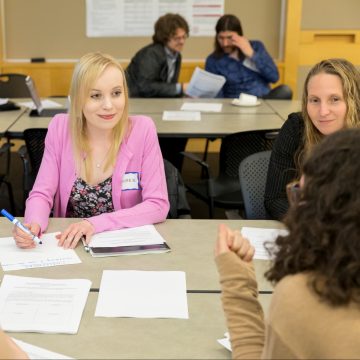Becoming Better Mentors Through Workshop Series
 By Katya Hrichak
By Katya Hrichak
Graduate students and postdoctoral scholars work hard to perfect curricula vitae, teaching and research statements, and cover letters as they look toward academic careers. At Cornell, many seek out additional opportunities to develop their teaching, mentoring, and communication skills. One such opportunity focused on close interaction with research students is Building Mentoring Skills for an Academic Career.
This spring workshop series helps a cohort of graduate students and postdocs develop effective communication and mentorship skills for working with undergraduates, graduate students, technicians, and postdoctoral researchers. By the end of the series, participants gain confidence and knowledge essential to not only successful academic careers, but their current roles as well.
Anna Wallis, a doctoral candidate in plant pathology and microbe biology, participated because mentoring represents a large part of her responsibilities as a Ph.D. student and complements her future aspirations.
“While I’ve had the opportunity to work with many students in both a classroom setting and one-on-one in the lab, I have never had any formal training in mentorship,” she said. “I’ve had several incredible mentors in my academic career and I hope to have the same positive impact on other future scientists.”
Similarly, Lauren Genova, a doctoral candidate in chemistry and chemical biology, found that the workshop was a “perfect opportunity to grow as a mentor, not just in preparation for my future career as a university professor, but also in my current mentorship roles.”
In addition to mentoring students in her lab, Genova works with undergraduates through the Graduate Students Mentoring Undergraduates Program and graduate students and postdocs through the Center for Teaching Innovation’s GET SET Workshops. Serving in these roles was part of Genova’s motivation to register for the series.
Through case studies, readings, and discussions, participants are encouraged to explore their mentoring philosophies, communication and conflict resolution skills, and awareness of diverse student needs. Participants also learn how to align mentor and mentee expectations and write strong recommendation letters. By gaining awareness of their own thought processes and working styles, graduate students and postdocs can begin to hone their techniques for use with current and future mentees.
According to Genova, the workshop is useful for those pursuing careers outside of academia as well: “The skills and resources you will gain are invaluable to any career path – and will help you out tremendously in your current role as a graduate student or postdoc, where you are likely simultaneously experiencing both sides of the mentorship experience as a mentor and a mentee.”
